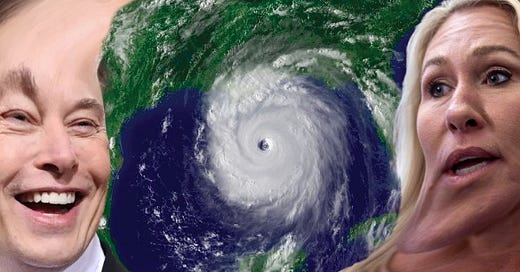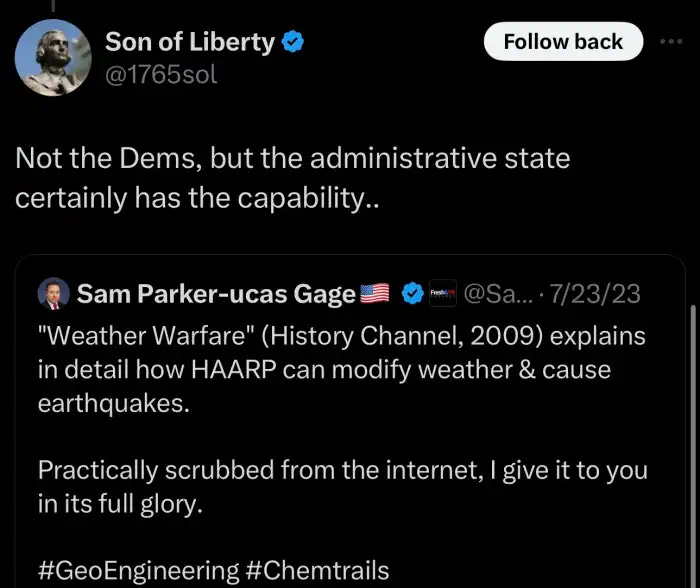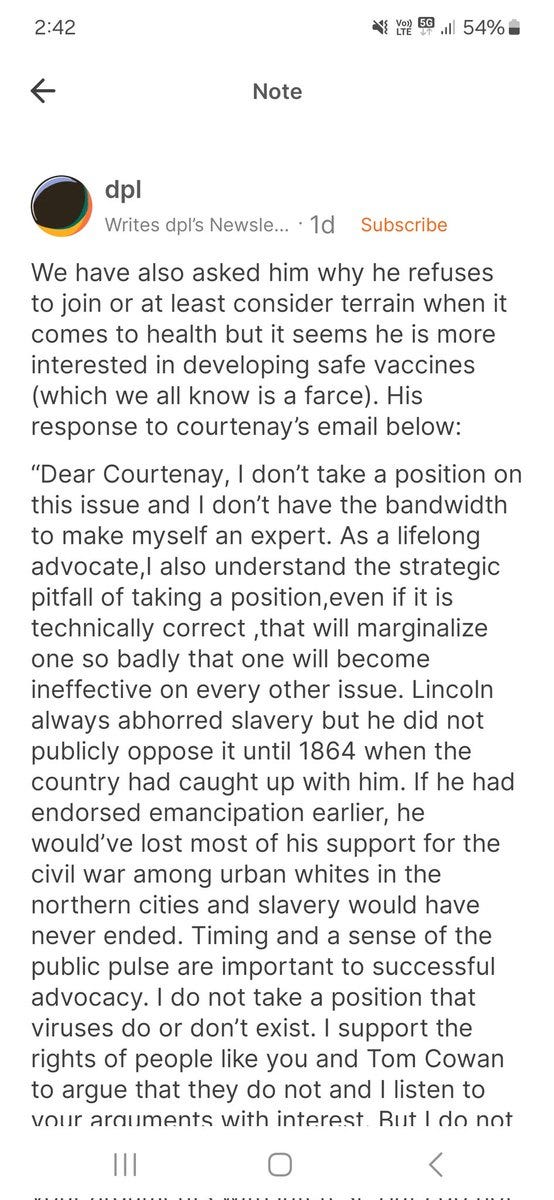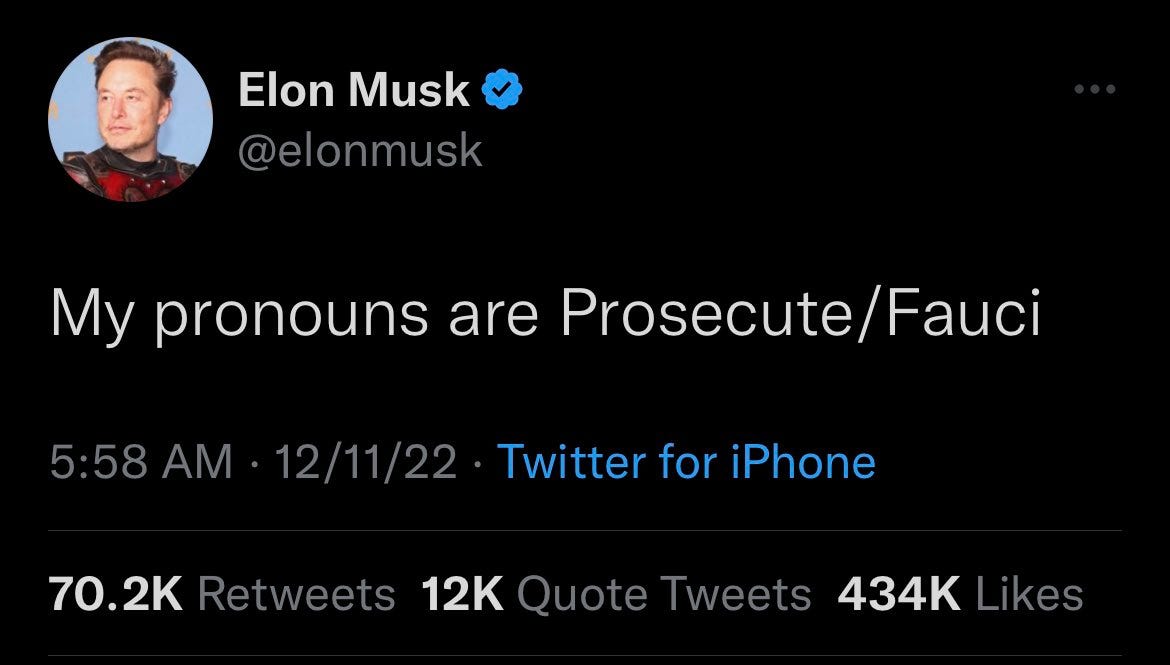No, They'll Never Believe in Climate Change: How Science Becomes Political
From climatology to vaccines, once science becomes Us Versus Them it's impossible to treat it objectively.
As the southern United States picks up the pieces after being smashed by two insanely powerful hurricanes in under a fortnight, the political discourse is tenser than ever, which is exactly what nobody wanted going into an already terrifying election. Every year there is a brand new “biggest storm ever recorded” and every year the right gets more and more annoyed that scientists keep stubbornly insisting that extreme weather can be caused by changes in the composition of the atmosphere, that the atmospheric composition can be changed by human activity, and that both of those things are currently happening.
This year the discourse has changed, though. This hurricane season represented several firsts. It was the first time in history (that is, since records began) that three simultaneous Atlantic hurricanes have formed in October. With Milton, it was the first time scientists have considered coining a Category 6 for storms until now impossibly powerful. The right can no longer claim in all seriousness that what we’re seeing in terms of extreme weather is a completely natural phenomenon. The storms are too fierce, now, their effects too tragic. The usual bleating about how the climate has always changed and the planet is still coming out of an ice age no longer sticks. The grief of those who are losing their homes if not their lives is just too real. For the first time mainstream conservatives have begun to express belief in man-made climate change.
By which they mean leftist weather machines.
Right on point, professional world champion of being wrong about things Matt Walsh only just got done making a smug victory announcement on his web show that there were no hurricanes this season, a week before Helene and Milton smashed inland.
Oops, Matt. Just fucking, oops.
I’ve heard people often say, as they gesture meekly toward some hopeful concept of justice, that climate science skeptics (or cynics as they’re better described) will one day come to a realisation all too late, when the ice caps melt and the sea sweeps their homes away. And they’ll weep and atone and beg forgiveness, and we’ll whisper “no.”
This bugfuck weather machine discourse is all the proof we need that this will never happen. Even if all of the worst predictions come true, they will never admit the predictions were accurate.
There’s something deeper and more insidious going down in the human psyche here than mere conspiratorial thinking or people’s general die hard resistance to admitting they were wrong. There’s some of that happening here, but a think a more powerful driving force here is that the science of climate change is Political. If you believe in certain scientific phenomena then you’re doing more than just accepting data, you’re choosing a team.
This is an even more robust form of belief than conspiracism. There is no mandate for people on the right to believe, for example, in a 9/11 conspiracy theory. That’s a false belief that’s mainstream enough to be almost the quintessential conspiracy theory and yet it is still considered alarming enough to be newsworthy when an elected official or high profile figure espouses it.
Anthropogenic climate change is actually easier to prove than the 9/11 conspiracy is to debunk, and yet, the belief that the world’s scientists are at best mistaken and at worst lying about it is so mainstream among the right, from your everyday person up to elected officials, that it’s highly unusual if they don’t hold it. Acceptance or otherwise of this particular scientific principle is divided among political lines.
When I say climate change is easy to prove, I mean on a much more practical and direct level than the wide scale effects we see with extreme weather events that people can claim aren’t directly related. It would be incredibly easy to debunk climate change if it weren’t true. All you’d have to do is prove any one or more of the following: (a) Carbon dioxide and/or other greenhouse gases do not absorb heat at any rate different to oxygen and nitrogen, (b) Burning fossil fuels does not release carbon dioxide (c) Human activity has not burned fossil fuels at a greater rate since the Industrial Revolution than before it, or (d) Temperature is not a factor in weather or climate. If all those things are true then the position that human activity isn’t driving climate change is the position that requires explanation.
And yet accepting this science is unique among scientific principles that it is mistaken for the same category of “beliefs” as either policy beliefs (such as corporate regulation or gun control), moral beliefs (such as drug use or homosexuality) or philosophical beliefs (such as whether a fertilised cell is a full human being). These are all things that can and do divide people because their wrong or right status isn’t defined in any way that a lab experiment can clear up for us.
Scientists will differ, sometimes wildly, on the scale and detail of climate change but the fact of it is an ontological position. It’s a true/false statement. Very similar to the way that the question of the existence of a particular god is ontological. It’s true or false. And similarly, when all of the available evidence falls to one side, the other position necessarily relies on faith.
The faith position is: Despite the fact that the climate is changing far more radically than natural processes alone can account for, and despite the fact that the observable facts fall in line with the model of human driven climate change, human driven climate change simply isn’t true.
That is until we reach where we are now, the point where an untenable position forces us to reach for an explanation that doesn’t disturb the faith statement. Therefore: Science fiction supervillain weather machines.
Very few scientific theories are treated like this, tied directly to a political position. Evolution is widely denied but it’s tied to religion. The field that comes closest to climatology in terms of political division, to my mind, is immunology—vaccines. That’s a fascinating example in itself because you can trace the change in public acceptance of the science to the point where it became political.
Climate change was always contentious, but hardline anti-vaccine rhetoric wasn’t as ubiquitous before Covid. It was common, but not so common that old diseases were coming back. The overwhelming majority of people accepted the science behind immunology.
Then came Covid, and along with it, government mandates and quarantines. The sacrifice for the greater good people argued fiercely with the let the weak die people. The right and the left diverged hard and Covid, the pandemic, the disease itself, became Political along with the proposals for dealing with it.
To be clear I think there was, and is, some exaggeration on all sides but the reaction of the far right, as usual, was the most childish. It’s not enough to simply disagree about public health measures—you’re now a communist traitor if you subscribe to the germ theory of disease. Efforts to slow the spread were stymied by the aggressive insistence that it was just the seasonal flu renamed to sound scarier. People started rejecting health protections not just for Covid but for all diseases. Anti-vaccination groups skyrocketed in membership and measles came back.
It's not enough to simply oppose policy you disagree with if the policy seems to follow very logically from the problem. To say that you agree that vaccines work against disease but you just don’t want them sounds juvenile and foot-stamping even in your own head and even if that’s the real truth. Few people are keen to use “don’t wanna” as their primary argument.
So you’ve got two alternative options: One, you can deny the problem. Deny, in this case, that disease is bad. This is the tactic that a lot of anti-vaccine parents take when they make arguments that deadly childhood diseases like measles and pertussis are actually rites of passage for children, or makes them stronger, or other infuriating bullshit. You hear similar stone cold rationalisations for Covid—that it’s a cleansing fire, that it rids society of the weak, or that the statistics are fudged and it doesn’t kill many people and everyone’s hysterical about an ordinary cold.
Two, you can deny the solution—that vaccines don’t work, or that the whole germ theory of disease is wrong from the outset, a monumental claim that throws out all health science since Pasteur. These are the kinds of arguments that Robert F. Kennedy Jr has been making his whole career, attacking the efficacy of vaccines, the science behind their production, their safety, and spuriously connecting them to things like autism (a rigorously disproven accusation). And while RFK Jr doesn’t, to my knowledge, hint toward germ theory denial in public, he’s happy to gesture toward it in private communication.
I don’t think RFK Jr would have been a strong third party candidate for president had the Covid pandemic never occurred and made vaccines Political.
Climate change and vaccines as politicised scientific topics share a number of common attributes in public acceptance. For one, the sciences themselves are not controversial within their fields. You cannot find any significant number of climatologists who deny anthropogenic climate change just as you can’t find a significant number of immunologists or epidemiologists who deny vaccines.
But the progression of science denial has followed a similar pattern as well. As the truth of the scientific consensus becomes more and more difficult to deny, the backlash intensifies until, inevitably, the scientists trying to warn about the problem are directly blamed for the problem itself. Like medieval puritans witnessing a time travelling scientist cure someone’s headache with medicine they don’t understand and immediately burning him as a witch because they can only determine that he caused the headache.
Scientists, immunologists and doctors have never been subject to the level of direct violence and death threats as they have experienced since this pandemic began. The right has been much more heavily focused on proving the almost completely debunked theory that Covid was manufactured in a laboratory and escaped accidentally or otherwise than they have been on finding any sort of solution to it. Anthony Fauci, director of the NIH agency responsible for mitigating Covid, has repeatedly been hauled in front of congress by Republicans eager to prove that he made the virus, accusations that are constantly amplified by Elon Musk because of fucking course he does.
And now, weather machines. Now it’s meteorologists who are being bombarded with death threats and needing to flee for their safety from enraged witch hunters, a sentence so bizarre that it could only be written earnestly in 2024. Marjorie Taylor Greene, the same dangerously unhinged congresswoman who led the charge to lock up Fauci for creating the Covid virus, now also wants to lock up scientists from the head of the BOM down to the guy who points at a green screen on your TV for creating hurricanes and launching them at red states.
Once a scientific principle has become Political, there is literally no way to compel a partisan to believe it. If there was a way to politicise bird flight, the right would be outside searching for the strings that hold them in the sky.
This all leads us to the question of how science becomes Political. And why it mainly seems to be the right who respond by denying the science.
My theory is something like this (keeping in mind that I’m speaking very broadly and generally, because human beings are extremely diverse and the right-left spectrum is wildly oversimplistic): Generally speaking, people on the left of centre are more concerned about safety, while people on the right are more concerned about control. Both sides tend to identify this about the other and hold it in the utmost contempt—the right sees the left as jittery panicky herd animals who “seek safety above liberty and thus deserve neither.” The left sees the right as identitarian egocentrists who put property above humanity.
The control that the right desires is primarily control over their own lives but can encompass control over other people’s lives as well if they’re sufficiently detached from those people and others’ behaviour brings them some discomfort. In short, people whose politics are a fair distance to the right tend to want the liberty to do whatever they feel like but also the liberty from having to be concerned about other people’s liberty (if, for example, you being gay makes me uncomfortable then I’d want the liberty to take your liberty away. Using a gun, maybe.)
In that mindset, people don’t really draw a distinction between a human authority trying to compel their behaviour or a natural law trying to do it. It doesn’t really matter if it’s a cop enforcing laws you don’t like or someone asking you to use a pronoun you don’t recognise or a disease compelling you to stab a needle in your arm or the state of nature compelling you to take greater care of how you treat the environment, the part of your mind that screams “don’t wanna” plainly does not care.
The further to the left you are the more likely you are to seek the safety of the whole group even if it decreases individual liberty, whereas the further to the right you are the more likely you are to lash out as an individual and assert your power. You can’t assert dominance against some fact of the universe, though, so you have to assert it against people. If the problem isn’t people, then, one way or another, you have to make it people. Then, once you’ve wrangled it into an our team versus their team narrative rather than an interpreting data exercise, it’s very difficult to look at the problem clearly and objectively.
On the left it’s okay for the enemy to be a hurricane or a virus. It’s an enemy that we can fight together as a society and as a species using our collective knowledge.
But on the right… the enemy can only be other people. It can’t be anything else.

















As David Brin frequently points out: ocean acidification. Take'em down to the shore, any shore, and have *them* measure it. There is no "natural cycle", there is no "history", there is no "it's always been this way". Well, that, and monetary bets.
But they won't make the bet, and they won't change their minds, because they don't care.
MAGA is to blame for not creating hurricane stopping weather machiness 😉.